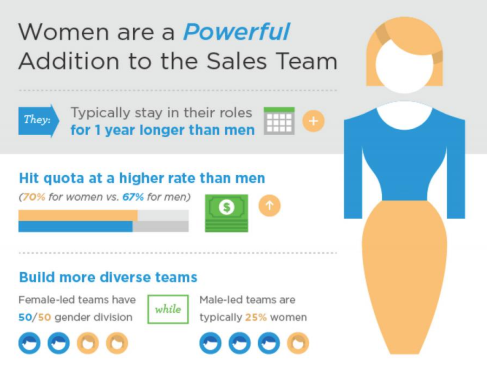
Women hold proportionally fewer sales roles than men and the number is dropping. The same researchers that investigated the personas of top salespeople discussed in my recent post also considered the differences between men and women in sales roles. The study estimated, for technology companies, “the sales force composition to be over 85% male.” Women have notoriously filled fewer positions in white-collar fields than men. For example, last year a report highlighted that “fewer large companies are run by women than by men named John.” This year, @CatalystInc discovered women only hold 4.6% of CEO positions at S&P 500 companies. Why are there few, and falling numbers of, women in these professional roles?
Velocify’s research report and companion piece to the “Account Based Selling: Stop Selling & Start Guiding” study, “The Similarities and Differences Between Men and Women in Sales”, revealed significant commonalities between the genders in terms of personality and skill set and notable deviations in those perceptions particularly influenced by external factors.
The Fisherwoman
Many surveyed women fell into the top-performing persona that makes up the Fisherman sales approach of my previous post with valued traits including patience and empathy. The question with the most significant differentiation between the genders’ answers was that on the favorite subject in school. While the majority of the women chose Language and English Studies, the top answers among males were History and Math. This question, thought to reveal the most about a potential salesperson’s perceptions and communication style, now becomes even more significant as it highlights a divide that starts long before career selection takes place.
The Female Perspective
Despite attempted awareness, gender imbalances in white-collar positions continue. The study found women consistently rated their levels of success in their careers lower than men. This is not due to skill level but rather the perception that women in professional roles tend to have. A survey participant stated “I find that in general, women are more likely to pass off success to their team or others.”
More women said they ended up in a tech sales position “by chance” than men, as women are less likely to be led to the industry in career guidance. In relation, an Open University poll this November found that many women did not follow a STEM career path because of lack awareness and role models. For sales, front-of-mind leaders are primarily men. For example, my own post referenced Don Draper as a stereotype for the successful salesperson.
It Starts Early
The differing paths for the two genders start early. Intel’s study this September found that still, “pink and blue toy categories are dominant in society.” It’s nothing new to hear that little girls are pushed to dolls and boys to building tools. What is new is the study’s finding that, even for toys geared to both genders, the boy version of the toy is more complex and, therefore, creates greater early interest and confidence in engineering skills.
Gender Imbalance Can Lead to Loss
For every girl with the ideal persona and talent to become a top salesperson that is led away from your field, you lose the opportunity for a stronger staff, improved innovation, and increased wins. For those still not hiring enough women, look out. Women are starting businesses at 1.5 times the national average, according to @womenwhotech. You might just be creating your own competitors.
Need more Proof? The Women in Sales Awards North America division released a informative infographic on the benefits of women in sales roles in their June 2016 issue. Read more facts by WIS and more about the great women in sales across North America: @WISAmerica

